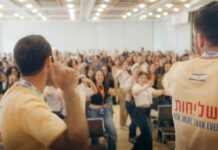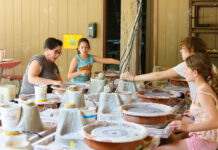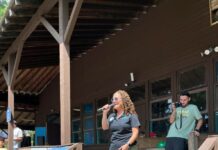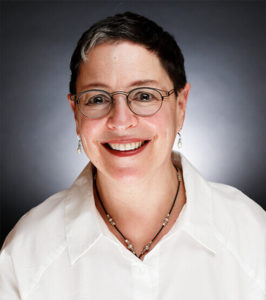
Debbie Albert was often gawked at by her public school classmates in the cafeteria during Passover, her kosher meals drawing unwanted attention.
That is how it was for most of the year: Albert was one of the few kids in her town who kept kosher and built a sukkah on Sukkot — one of the few religious Jews.
But over the summers, things were different. For eight weeks out of the year for eight years, Albert, along with a gaggle of Jewish teens, would spend each morning singing the morning prayers and Friday night celebrating Shabbat at Camp Ramah in the Poconos. The feelings of isolation and otherness Albert had for the other 44 weeks of the year melted away.
“When you’re at camp, you don’t have to explain your Judaism,” Albert said. “It’s just part of your being.”
It’s that feeling that kept her coming back to Ramah, not only as a camper but as a member of Camp Ramah in the Poconos’ board of directors. As president of the board since October 2019 — and a board member for another seven years — Albert, 61, has steered the camp and its three prongs (the sleepaway camp, day camp and Tikvah program for campers with special needs) during two pandemic summers.
After a camp-less summer in 2020, 2021 brought a unique challenge. Kids were thrilled to return to camp, but a year of pandemic living left its mark on campers’ mental health.
“The kids had one of the best summers of their lives; the staff had maybe one of the hardest of their lives,” Albert said.
Ramah staff paid extra emotional care to campers, helping them adjust to being back around a large group of kids or being away from parents after a year cooped up in their homes.
As 2022 and a new normal approaches, it provides another opportunity to take stock of the almost 50 years Albert has been involved in Ramah. It will also be her first time returning to camp since becoming board president.
“Everything and nothing” has changed since Albert was a camper, she said.
A new generation of campers raised on technology are arriving at camp, but they are happy to relinquish their phones for the summer. Many even say that’s the best part of the eight-week experience, Albert said.
Without kids tethered to their phones, Ramah has maintained the founding spirit of the camp.
“The thing that hasn’t changed is the way we celebrate Shabbat and the way we talk about Israel,” Albert said. “The values of Judaism have remained intact, of course, and that’s been the same since the ’50s, when camp started, to today.”
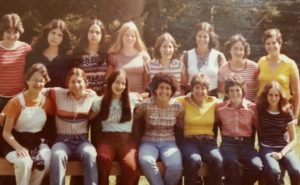
Albert sent her kids to Camp Ramah in the Poconos and continued to donate money to the organization but didn’t take on a leadership role there for decades after her time as a camper.
After getting a bachelor’s degree in journalism from George Washington University, Albert, a Dresher resident, returned to Philadelphia to work as an assignment editor for channels 3 and 6 news.
Her time in journalism was short-lived, however, due to burnout from the job. She coincidentally got in touch with her 12th-grade teacher around the same time, who helped Albert pivot toward public relations. Albert worked for the Spectrum arena and various trade organizations before joining Aramark for 15 years.
In 2010, Albert left Aramark to build her own PR company but later rejoined Aramark under the new title of senior vice president of Corporate Communications.
Camp Ramah was never far from Albert’s thoughts. A member of both Adath Israel in Merion Station and Temple Sinai in Dresher, Albert has always been involved in the Jewish community. She’s still in touch with her edah, her cohort of campers, many of whom she met in 1973.
“I talk to them all the time,” Albert said. “When you live with people … it creates a bond that lasts a long time. Forever, I would have to say.”
The longevity of their friendship exists outside of the campgrounds, but it is also unique to the experience of Camp Ramah.
“You’re surrounded by teachers and rabbis and the culture and Zionism in a way that you can’t be in our secular world,” Albert said. “When you go there, you’re having the time of your life, and you’re being Jewish, and it’s seamless.”



